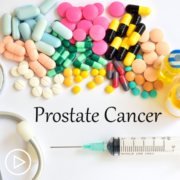Understanding Advanced Prostate Cancer Treatment Approaches
Understanding Advanced Prostate Cancer Treatment Approaches from Patient Empowerment Network on Vimeo.
What approaches are available to treat advanced prostate cancer? Dr. Rana McKay discusses advanced prostate cancer treatment goals and reviews current options for patients.
Katherine Banwell:
We’re going to talk about treatment approaches. But first, how would you define treatment goals?
Dr. Rana McKay:
So, you know when I look at defining treatment goals it’s focusing on what do we want to achieve from the standpoint of the cancer? Meaning, you know, what are objectives that are associated with patients living longer?
And then what are objectives and strategies that we can set-up to make sure that patients are living better? So, I think the treatments are basically set up to basically help you achieve those two goals. What can we do to help you live longer and feel better?
Katherine Banwell:
Yeah. Well, let’s walk through the types of treatments that are used today to treat advanced prostate cancer. What are the treatment causes and who are they appropriate for? Let’s start with surgery, for instance.
Dr. Rana McKay:
So, surgery is something that’s utilized early on when people are diagnosed with cancer. It tends to be utilized when the cancer has not necessarily spread to other parts of the body but is still localized within the prostate itself, or maybe there’s just some little bit of breakthrough in the capsule. Sometimes it can be used in people who have involvement of the prostate cancer in the lymph nodes. But it’s generally not utilized in people who have cancer that’s spread to other parts of the body.
Katherine Banwell:
Mm-hmm. What about other treatment classes? What are they?
Dr. Rana McKay:
So, radiation can also be utilized. Radiation is a treatment modality that can be used for people with localized disease, and also it can be utilized for people with advanced disease to treat the primary tumor.
Additionally radiation therapy can be used to help treat symptoms if there’s a bone lesion causing pain or other areas that are causing discomfort. Sometimes radiation to those areas can mitigate pain. When I think about the treatment classes for prostate cancer, they generally break down into several categories. The first, most predominant category is the hormonal therapy category. Hormonal therapies are really the backbone of treatment for men with prostate cancer, and they include the more traditional hormonal therapies that really work to just drop testosterone. So, just LRH – L – LRHA agonists and antagonists and also, they include newer hormonal therapies in the form of pills that really target strategies at also affecting testosterone function and testosterone production. Another class is also the chemotherapy agents. There are two FDA-approved chemotherapies for prostate cancer that are life-prolonging, and there’s a certain role for chemotherapy for people with advanced disease.
There’s also immunotherapy that can be utilized. There’s a vaccine therapy that’s actually one of the first FDA vaccines for any solid tumor that’s proving in prostate cancer that can be utilized. There’s also radio pharmaceuticals.
So, these are specific agents that deliver bits of radiation to specific areas. Whether it be radium 223, which targets the bone or the newest radio pharmaceutical, which was approved called Lutetium PSMA that basically delivers beta-radiation to little – sites of PSMA expressing cancer cells and the last category that I would highlight is the category of targeted therapy. There are two targeted therapies for prostate cancer for patients who have like genomic alterations. Those include the drugs olaparib and rucaparib. So, as you can see there’s a wide spectrum of drugs that can be utilized to really keep this disease at bay.













